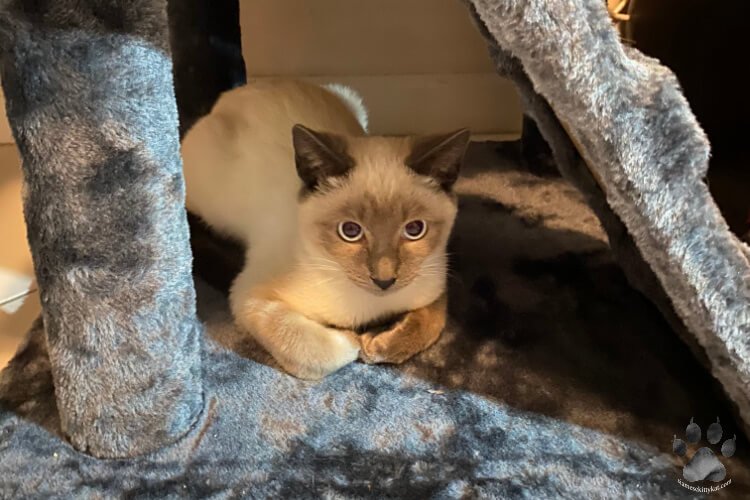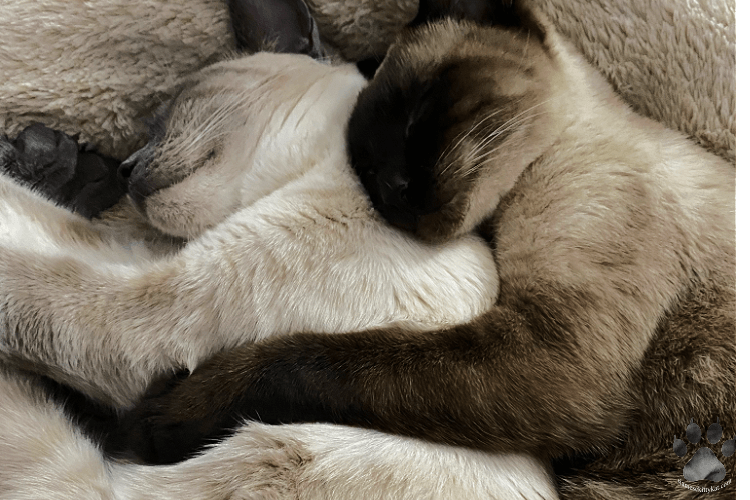Siamese cats are known for their mysterious behavior. This makes it difficult to tell what is going on inside their heads. However, research revealed that cats can express many complex emotions. This ranges from joy and contentment to fear and anger.
Most owners are familiar with their cat’s behavior. Our cats can be playful one minute and then curled up, napping the next. Cat owners can tell when their cat is feeling excited or relaxed.
You’ll understand your cat’s emotional state better by learning to read his body language and vocalizations.
Are Siamese Cats Emotional?
Cats are complex creatures, and different breeds of cats have different personalities. One of the more popular cats, the Siamese, are known for their vocal nature and bright personality. But do they have actual emotions like humans? The answer is yes!
All cats can express basic emotions. These include fear, happiness, contentment, sadness, and even frustration. This means a Siamese cat can display these feelings as any other cat breed. It’s easy for owners or cat lovers to recognize when these emotions arise in our feline friends.
What Emotions Do Siamese Cats Feel?
Fear and Aggression
Siamese cats are prone to startle easily by loud noises or sudden movements. Even harmless objects such as telephones or vacuums can frighten them. You must gently introduce new objects to ensure your cat feels comfortable.
Siamese cats exhibit aggressive behavior when threatened or provoked by another animal or person. A Siamese cat will arch its back and sometimes strike out with its claws during an act of aggression.
Happiness and Contentment
A Siamese cat will often purr and rub against its owner when feeling happy and contented. Playful behavior like chasing toys and rolling around are common ways they show delight in their surroundings.
Siamese cats have a relaxed body posture when expressing contentment. Its tails curled around its feet or relaxed ears folded back on its head.
A Siamese cat’s emotions can change depending on its environment and how its owners treat it. Signs of unhappiness include:
Sadness and Grief
Kittens often suffer from detachment issues and the fear of abandonment. This is because they depend on their caregivers for survival and social interaction.
They form attachments to toys, companions, territory, and other beloved items or people as they grow. It can cause distress in cats of any breed, including Siamese cats, if these items or people are lost or taken away.
This is considered normal behavior. However, further intervention may be needed if a pet is showing signs of prolonged depression.
You must offer love and comfort while allowing them time to process their emotions on their terms. Extra cuddles, playtime, and treats will help lift their spirits during this period.
Do Siamese Cats Cry a Lot?

Cats don’t cry as humans do. However, they express sadness or pain through vocalizations like constant meowing and yowling. This is true for Siamese cats because of their talkative and expressive nature.
Siamese cats tend to meow more than other breeds due to their outgoing personalities. This makes them express themselves vocally when something doesn’t feel right.
There are a few things you can do to reduce the amount of crying from your Siamese cat if you find it too excessive:
Do Siamese Cats Get Jealous?
Siamese cats have strong streaks of jealousy and possessiveness.
A jealous Siamese cat will try to win back its owner’s affection through loud meowing. Things can escalate, and the cat can become aggressive or even lash out physically.
Unrequited love causes them to suffer from depression and anxiety in extreme cases.
A Siamese cat’s tendency to be jealous starts as early as it is still a kitten. Kittens learn to interact with humans and other animals during these formative months. This is when they form bonds and learn to share. However, Siamese kittens will grow up feeling resentful and territorial of their resources if socialization is not taught properly.
All cats, however, experience jealousy at different points in their lives. This jealousy may be due to changes in routine or environment, such as when a new pet is at home.
Positive reinforcement is the best way to deal with any signs of jealousy. This includes offering treats when it behaves appropriately around other animals.
I’m sure all you cat lovers out there can understand my dilemma. I have two cats, Batman and Robyn. Robyn is a little jealous. She always wants to be the center of attention. It can be pretty frustrating sometimes.
But I’ve learned a few tricks over the years to help manage her jealousy. The most important thing is to give each cat plenty of love and attention. That way, they don’t feel like they’re being left out.
I also make sure each cat has their own space where it can feel safe and comfortable. This means multiple litter boxes or providing each cat with its own bed or scratching post. I try not to give any preferential treatment to one kitty over another.
Do Siamese Cats Get Depressed?

Siamese cats may be known for their social nature, but they can also suffer from depression if left alone for too long.
All cats form strong bonds with their owners, but Siamese cats tend to be more attached. They can become lonely and sad if not given enough companionship.
How can I tell if my Siamese cat is depressed?
Depression in cats is indicated by changes in behavior, such as:
You may consider getting an additional pet to spend time with your Siamese when you’re not available.
Can You Hurt a Siamese Cat’s Feelings?
We do many things that hurt our Siamese cats’ feelings without us even realizing it.
1. Pushing Them Away
One of the most obvious ways to hurt a cat’s feelings is by pushing them away when they come up for some love or attention. Remember that cats tend to be very sensitive creatures. An act of aggression such as this could easily upset them.
2. Leaving Out Old Food for Them
Some cats may find leftovers tasty and filling, but others may not appreciate the gesture. The sight of the old kibble might make them feel unappreciated or neglected. This is especially true if your pet is used to getting freshly prepared meals each day.
3. Not Cleaning the Water or Food Bowls
Dirty water or food dishes can create feelings of displeasure in cats. Cats are known for their fastidiousness and love of cleanliness. Having dishes filled with stale water and food can cause discomfort or anxiety.
4. Teasing
Some cats don’t mind a bit of playfulness now and then, but too much teasing can become overwhelming. It may startle or frighten them instead of making them feel loved and cherished.
5. Shouting
Loud noises may be seen as intimidating. Shouting could make
them feel scared or anxious about being around you in future interactions.
Too much shouting might negatively shape how your cat perceives its environment. This makes it harder for them to trust humans in general.
6. Not Cleaning the Litter Box
Not only will this make the litter area smell bad. It could also give off cues that you don’t care enough about your pet’s well-being. Make sure you scoop out the mess daily and change the litter every few weeks.
Do Siamese Cats React When You Cry?
Siamese cats are intelligent and attentive animals. They have an uncanny ability to recognize facial expressions, body language, and sounds. This helps them to identify when people are feeling emotional.
Siamese cats show affection in response to a person’s tears. They may rest on their lap and provide emotional support. They may also display vocalizations to indicate they understand how their owners feel and want to provide comfort.
Do Siamese Cats Apologize?
Cats may not know how to say “I’m sorry” in human terms, but they often have ways of apologizing. For example, a Siamese cat may come up to its owner and purr softly when it misbehaves. This serves as an apology for its naughty behavior.
Some cats may meow plaintively or lay down on the floor next to their owner as if begging for forgiveness. This shows that the cat understands that his behavior was wrong and may be trying to express guilt.
Another sign your Siamese cat is apologizing is if it brings you a gift. This includes a dead mouse or a bird as an offering of peace. Your feline friend is trying to make amends if he greets you with gifts after being scolded.
Siamese cats have emotions. These felines can express a range of emotions, from happiness to sadness. They show their affection through meowing and purring. They express fear and anxiety differently, such as through hissing or hiding.
It’s impossible to know exactly what a cat feels at any given time. However, these behaviors suggest that these felines experience emotions like humans.
Want to immerse yourself more in the captivating world of Siamese cats? I’ve got all the information you need from their distinct color points to their fun personalities: Siamese Cats: Unique Features and Personality
Want to learn more about your Siamese cat’s behavior? We have compiled every information you need to navigate through the fascinating world of Siamese cats: Everything About a Siamese Cat’s Behavior: A Comprehensive Guide
